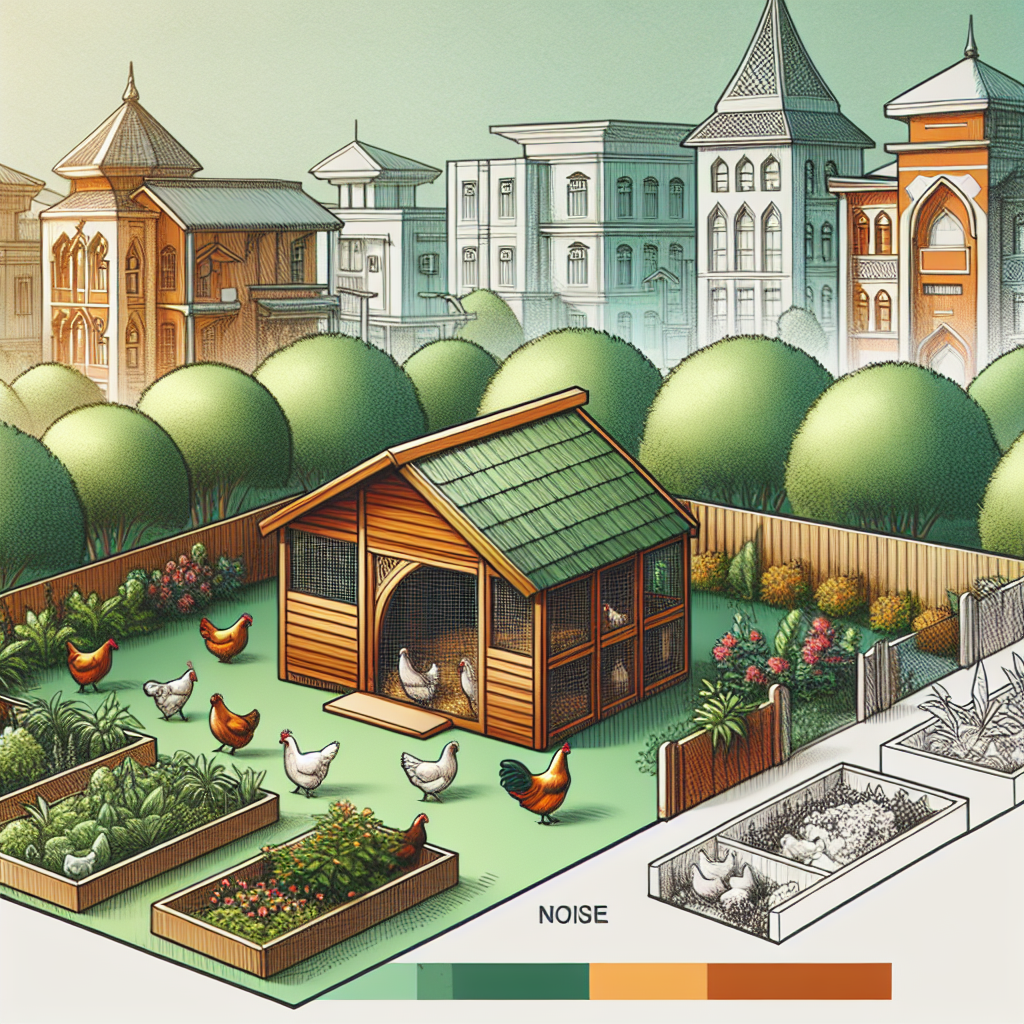
Urban chicken-keeping has become increasingly popular in recent years, as more people are embracing sustainable living and the joy of raising their own flock. However, with this newfound hobby comes a set of challenges, particularly when it comes to noise regulations and dealing with potentially disgruntled neighbors. This article serves as a guide to help you navigate the complexities of protecting your feathered friends and fostering harmony with your community.
Understanding Noise Regulations for Urban Chickens
Noise regulations refer to laws and guidelines that govern the acceptable noise levels in an urban environment. These regulations are put in place to maintain peace and harmony within the community and to address any issues caused by excessive noise. When it comes to urban chickens, noise regulations typically apply to the sounds they produce, such as clucking, squawking, and crowing.
How do noise regulations apply to urban chickens?
Just like any other animal, urban chickens are subject to noise regulations, which means that their owners must take measures to ensure that their chickens’ noise levels do not disturb the peace and quiet of the neighborhood. Failure to comply with these regulations can result in penalties, fines, or even the removal of the chickens from the property.
Specific noise regulations for keeping urban chickens
The exact noise regulations for urban chickens may vary depending on your location. It is important to familiarize yourself with the specific regulations in your area to ensure that you are in compliance. Some common noise regulations for urban chickens may include:
- Limiting the number of chickens allowed on a property.
- Restricting the ownership of roosters.
- Specifying quiet hours during which noise from chickens must be minimized.
- Setting maximum noise decibel levels that chickens must not exceed.
- Requiring soundproofing or noise-reducing measures to be implemented in the chicken coop.
It is essential to understand and adhere to these regulations to maintain a harmonious relationship with your neighbors and the local authorities.
Addressing Neighbors’ Complaints
Dealing with neighbors’ complaints is an important aspect of keeping urban chickens. Good communication and a willingness to address their concerns can go a long way in fostering positive relationships within the community.
Communication with neighbors
Maintaining open and transparent communication with your neighbors is crucial when it comes to addressing any issues related to your urban chickens. Take the time to introduce yourself and your chickens to your neighbors, and inform them of your intentions to keep chickens on your property. Be receptive to their concerns and suggestions, and assure them that you are committed to finding solutions that work for everyone.
Identifying specific concerns
When neighbors raise complaints about your chickens, it is important to identify the specific concerns they have. Is it the noise that bothers them? Is it the smell or the potential disruption to their daily activities? Understanding their perspective will help you tailor your solutions and approach accordingly.

Negotiating compromises
Once you have identified your neighbors’ concerns, it is important to work together to find compromises that address those concerns while still allowing you to keep your urban chickens. This may involve adjusting the coop’s location, implementing noise-reducing measures, or agreeing on specific quiet hours for the chickens. Remember, compromise and understanding are key to maintaining positive relationships with your neighbors.
Creating a Coop Design to Minimize Noise
One effective way to mitigate noise issues with urban chickens is to design and construct a chicken coop that minimizes noise output. With careful planning and consideration, you can create a coop that not only provides a comfortable and safe environment for your chickens but also keeps the noise at a manageable level.
Choosing the right location for the chicken coop
Selecting an appropriate location for your chicken coop is crucial in minimizing noise disturbances. Consider placing the coop away from neighboring houses and bedrooms. Opt for areas with natural sound barriers, such as existing vegetation or fences, which can help absorb and reduce noise.
Utilizing soundproofing materials
Incorporating soundproofing materials into the construction of your chicken coop can significantly reduce noise levels. These materials may include insulation for walls, floors, and roofs, as well as acoustic panels or curtains. By preventing noise from escaping the coop, you can minimize disturbances to your neighbors.
Optimizing ventilation without increasing noise
Proper ventilation is important for the health and well-being of your chickens. However, it can also be a potential source of noise. To strike a balance, consider installing sound-dampening ventilation systems or using innovative designs that allow for adequate air circulation without generating excessive noise.

Implementing noise-reducing features in coop construction
During the construction of your chicken coop, consider implementing noise-reducing features. For example, you can add extra insulation to the walls or use double-glazed windows to minimize sound transmission. Additionally, designing the coop with solid doors and windows instead of wire mesh can help contain noise within the structure.
By incorporating these measures into your coop design, you can significantly reduce noise levels and ensure a peaceful coexistence with your neighbors.
Implementing Noise Control Measures
While designing a noise-friendly coop is important, it is equally crucial to implement noise control measures in your daily chicken-keeping routine. These measures can help minimize noise disruptions and create a peaceful environment for both your chickens and your neighbors.
Maintaining a consistent daily routine
Creating a consistent and structured routine for your chickens can help minimize noise disturbances. Feed them at regular intervals, and clean the coop at designated times to avoid unnecessary commotion. By establishing a predictable schedule, your chickens will become accustomed to the routine and may be less likely to create excessive noise.
Training chickens to reduce noise
Chickens can be trained to respond to certain cues, including noise-related behavior. Consider employing positive reinforcement techniques to train your chickens to be quieter. For example, reward them when they remain calm during specific situations or when they respond to verbal cues. With time and patience, your chickens can learn to reduce their noise levels.
Utilizing white noise or sound masking techniques
White noise or sound masking techniques can be effective in minimizing the impact of chicken noise. You can strategically place white noise machines or fans near your chicken coop to create a constant, ambient sound that helps mask the chicken noises. This can provide relief to both you and your neighbors, as it helps mitigate any intermittent or sudden bursts of noise.

Strategic positioning of coop within the property
Consider the positioning of your chicken coop within your property to minimize noise disturbances. Placing the coop further away from neighboring houses or erecting noise barriers, such as fences or vegetation, can help contain and reduce noise levels.
By implementing these noise control measures, you can create a more enjoyable environment for both yourself and your neighbors, ensuring a harmonious coexistence.
Managing Roosters in Urban Settings
Unlike hens, roosters are typically not allowed in urban settings due to their tendency to crow loudly. However, if permitted by local regulations, there are measures you can take to manage and reduce rooster crowing.
Understanding regulations on rooster ownership
Before considering owning a rooster in an urban setting, it is crucial to familiarize yourself with the specific regulations in your area. Many cities and neighborhoods have strict regulations or outright bans on roosters due to the noise they produce. Ensure that you are in compliance with these regulations before acquiring a rooster.
Alternative options for urban roosters
If roosters are not permitted in your area, consider alternative options. Inquire about rooster rehoming programs or seek out local farms or organizations that may be able to provide a suitable home for your rooster. By responsibly and ethically finding a new home for your rooster, you can ensure that it remains in a suitable environment while ensuring compliance with local regulations.
Reducing rooster crowing through behavioral training
If roosters are allowed in your area, training can be an effective way to reduce crowing behavior. Utilize positive reinforcement techniques to reward quiet and calm behavior. Additionally, consider providing your rooster with ample mental and physical stimulation, which can help divert their attention and reduce the frequency and intensity of crowing.
By understanding regulations, exploring alternative options, and implementing behavioral training, you can manage rooster crowing and maintain a harmonious environment in your urban setting.
Educating Neighbors about Urban Chicken Benefits
Educating your neighbors about the benefits of urban chickens can help alleviate concerns and build support within the community. By sharing information and dispelling common misconceptions, you can foster a better understanding of the positive impact of urban chicken keeping.

Organizing neighborhood information sessions
Consider organizing neighborhood information sessions to provide your neighbors with an opportunity to learn about urban chicken keeping firsthand. Prepare informational materials, such as brochures or handouts, that highlight the benefits and address any concerns. Encourage your neighbors to ask questions and engage in open dialogue during these sessions.
Highlighting the positive impact of urban chickens
Emphasize the numerous benefits that urban chickens can bring to a community. Discuss how keeping chickens can promote sustainable living, provide fresh eggs, and reduce food waste through composting. Highlight the educational opportunities for children and the positive impact of reconnecting with nature that urban chicken keeping can provide.
Dispelling common misconceptions
Address any common misconceptions or myths surrounding urban chicken keeping. Assure your neighbors that with responsible practices and proper maintenance, issues like noise, odor, and disease can be effectively managed. Provide evidence-based information and personal experiences to guide them towards more accurate and informed opinions.
Sharing success stories from other urban chicken keepers
Share success stories from other urban chicken keepers in your area or from similar urban settings. Showcasing positive examples of responsible chicken keeping can help reassure your neighbors and provide them with real-life examples of how chickens can be integrated successfully into an urban environment.
By educating your neighbors and fostering a culture of understanding, you can create a more supportive and accepting community for urban chicken keeping.
Seeking Legal Advice on Local Regulations
Navigating the complex legal landscape surrounding urban chicken keeping can be challenging. Seeking legal advice and guidance can help you understand the specific regulations in your area and ensure compliance with local laws.

Researching local laws and ordinances
Start by conducting thorough research on the specific laws and ordinances governing urban chicken keeping in your area. Check with your local municipality, zoning board, or agricultural department for relevant information. Understanding the legal framework is essential to avoid any penalties or conflicts in the future.
Consulting with an attorney specializing in urban agriculture
Consider seeking the expertise of an attorney who specializes in urban agriculture or local regulations pertaining to keeping livestock. An attorney can provide tailored advice based on your specific circumstances, ensuring that you are well-informed and compliant with all legal requirements.
Understanding enforcement mechanisms
In addition to understanding the regulations themselves, it is vital to comprehend the enforcement mechanisms in your area. Familiarize yourself with the procedures for reporting noise complaints or other concerns related to urban chicken keeping. Being aware of the enforcement mechanisms can help you address issues promptly and maintain a good standing within the community.
Navigating legal processes
If you encounter legal challenges or disputes related to your urban chickens, it is important to navigate the legal processes effectively. This may involve attending hearings, engaging in mediation, or seeking necessary permits. By having a clear understanding of these processes, you can protect your rights and work towards resolving any legal issues that may arise.
Seeking legal advice and understanding the legal framework will empower you to navigate the complexities of urban chicken keeping in a lawful and responsible manner.
Engaging in Community Outreach
Community outreach can play a vital role in fostering a positive perception of urban chicken keeping and building strong relationships within your neighborhood. By collaborating with local organizations and participating in community events, you can contribute to the education and awareness of urban chicken keeping.
Joining or forming local urban chicken associations
Research and reach out to local urban chicken associations or organizations in your area. By joining forces with like-minded individuals, you can advocate for urban chicken keeping and collectively address concerns or issues that arise within the community. These associations can also provide a platform for sharing knowledge, experiences, and support.
Participating in community events and fairs
Actively engage with your community by participating in local events and fairs. Set up informative booths or displays about urban chicken keeping, providing literature and answering questions. This allows you to share your firsthand experiences and engage in meaningful conversations with your neighbors.
Offering workshops and information sessions
Consider organizing workshops or information sessions on urban chicken keeping. Invite experts or experienced chicken keepers to share their knowledge and provide practical tips. Generating interest and awareness through these educational opportunities can help dispel misconceptions and promote responsible chicken keeping practices.
Collaborating with local authorities for community education
Reach out to your local authorities, such as animal control departments or municipal offices, to explore opportunities for collaboration on community education initiatives. By working together, you can provide accurate information, promote responsible ownership, and address any concerns or misconceptions from an official standpoint.
Community outreach is a powerful tool for fostering understanding and support for urban chicken keeping. By actively participating in the community, you can contribute to a positive perception of urban chicken keeping and maintain strong relationships with your neighbors.
Maintaining Good Hygiene Practices
Maintaining good hygiene practices is crucial when keeping urban chickens. This not only ensures the health and well-being of the chickens but also minimizes odors and potential hygiene-related concerns that might bother your neighbors.
Managing odors and waste disposal
Proper management of chicken waste is essential to prevent odors and maintain a clean environment. Regularly clean the chicken coop, removing any accumulated waste and soiled bedding. Consider composting chicken manure as a sustainable waste management solution. By properly managing waste, you can reduce odors and minimize any potential concerns from your neighbors.
Regularly cleaning the chicken coop
Regular cleaning of the chicken coop is essential for maintaining good hygiene. Remove any debris, dust, or dirt that may accumulate in the coop. Regularly replace soiled bedding to prevent the buildup of bacteria and control odors. Maintaining a clean and sanitary coop not only benefits your chickens but also promotes a healthier living environment for everyone.
Implementing biosecurity measures
Implementing biosecurity measures is crucial to prevent the spread of diseases between your chickens and potentially to other animals or neighbors’ pets. This includes practices such as quarantine for new chickens, proper handwashing, and using disinfectants to clean equipment and surfaces. Educate yourself and your neighbors on the importance of biosecurity and how it helps maintain the health and well-being of your chickens and the entire community.
Educating neighbors on the importance of hygiene
Take the initiative to educate your neighbors about the importance of good hygiene practices in urban chicken keeping. Provide information on how you manage waste, clean the coop, and maintain biosecurity. By sharing your knowledge, you can help alleviate any concerns and demonstrate your commitment to responsible and hygienic chicken keeping.
Maintaining good hygiene practices is not only essential for the health of your chickens but also plays a crucial role in maintaining positive relationships with your neighbors.
Considering Alternative Pet Options
If concerns about noise regulations and neighbors’ complaints persist, it may be worth considering alternative pet options that are better suited for an urban environment. While chickens offer many benefits, exploring other pet options can help address any ongoing issues and ensure a harmonious living situation for everyone.
Exploring non-chicken pets suitable for an urban environment
Research different pet options that are suitable for an urban environment. Consider pets such as cats, small breed dogs, rabbits, or guinea pigs, which generally produce less noise and have minimal impact on their surroundings. Assess the space, time commitment, and requirements of each potential pet to find an appropriate match for your living situation.
Weighing pros and cons of different pet options
Evaluate the pros and cons of each potential pet option. Consider factors such as noise levels, maintenance requirements, compatibility with your lifestyle, and potential impact on your neighbors. By carefully weighing the advantages and disadvantages, you can make an informed decision that suits both your desires and the needs of your community.
Engaging in responsible pet ownership
Regardless of the pet you choose, responsible pet ownership is essential. This includes providing proper care, training, and socialization for your pet, as well as respecting any regulations or guidelines in your area. By being a responsible pet owner, you can enhance your relationship with your neighbors and create a positive environment within your community.
While urban chickens can offer unique benefits, considering alternative pet options can be a proactive way to address noise concerns and ensure a peaceful living environment for all.
In summary, understanding noise regulations and addressing neighbors’ complaints are vital aspects of keeping urban chickens. By designing a coop that minimizes noise, implementing noise control measures, and managing roosters responsibly, you can mitigate noise disturbances. Educating neighbors, seeking legal advice, and engaging in community outreach will foster understanding and positive relationships. Maintaining good hygiene practices and considering alternative pet options can also contribute to a harmonious urban environment. With proper planning and consideration, you can enjoy the many benefits of urban chicken keeping while respecting the needs and concerns of your neighbors.







